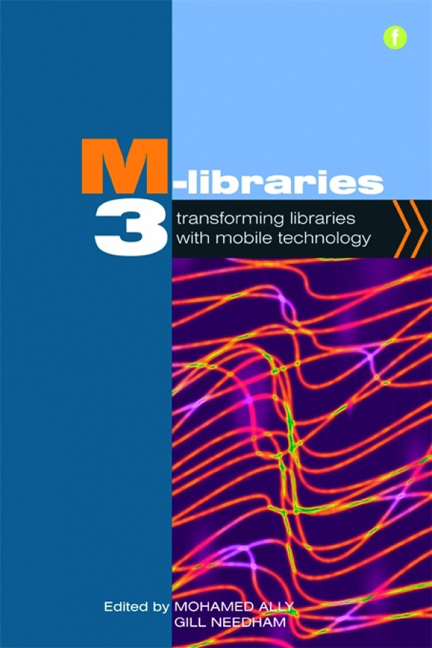Book contents
- Frontmatter
- Contents
- Acknowledgements
- Contributors
- Foreword
- Introduction
- 1 Education for all with mobile technology: the role of libraries
- PART 1 DEVELOPING MOBILE SERVICES
- PART 2 PEOPLE AND SKILLS
- 9 Staff preparedness to implement mobile technologies in libraries
- 10 Apps and attitudes: towards an understanding of the m-librarian's professional make-up
- 11 There's a librarian in my pocket: mobile information literacy at UTS Library
- 12 Exploring student engagement with mobile technologies
- 13 It's just not the same: mobile information literacy
- 14 The students have iPods: an opportunity to use iPods as a teaching tool in the library
- PART 3 FOCUS ON TECHNOLOGY
- Conclusion
- Index
13 - It's just not the same: mobile information literacy
from PART 2 - PEOPLE AND SKILLS
Published online by Cambridge University Press: 08 June 2018
- Frontmatter
- Contents
- Acknowledgements
- Contributors
- Foreword
- Introduction
- 1 Education for all with mobile technology: the role of libraries
- PART 1 DEVELOPING MOBILE SERVICES
- PART 2 PEOPLE AND SKILLS
- 9 Staff preparedness to implement mobile technologies in libraries
- 10 Apps and attitudes: towards an understanding of the m-librarian's professional make-up
- 11 There's a librarian in my pocket: mobile information literacy at UTS Library
- 12 Exploring student engagement with mobile technologies
- 13 It's just not the same: mobile information literacy
- 14 The students have iPods: an opportunity to use iPods as a teaching tool in the library
- PART 3 FOCUS ON TECHNOLOGY
- Conclusion
- Index
Summary
Introduction
Libraries are increasingly developing services that take into account the massive impact of mobile devices on their users. This chapter looks at what this might mean for information literacy.
Some databases and library catalogues have mobile versions. Growing numbers of our users have the devices to access these. When a library user is as likely to search for information on a mobile phone, tablet or hand-held gaming device as on a fixed PC in a physical library, this could change the concept of what it means to be information literate. How will mobile search change the discovery, evaluation and reuse of information? We will first consider whether we need to develop a new lens through which to view the literacies required by our clients. From these theoretical considerations we will then proceed to a quick review of experience of mobile devices gained at two UK new universities: Bedfordshire and Huddersfield.
Libraries could presently be in their greatest period of change: we have moved on from the hybrid library, we are facing a public perception of electronic delivery of all content, and Web 2.0 has given everyone the potential to author and to share. Now add to this the phenomenal spread of mobile devices the world over. Information is becoming mobile and social. It also appears that the economic recession that has affected large parts of the world may not slow these developments. Librarians must spend more time over coming months conditioning their services to the mobile environment.
How does mobile technology affect information literacy?
The image of young students who are continually wired into the online environment, texting and multi-tasking, has been overdone. It has been easy to exaggerate the differences of the web generation. The CIBER reports (Rowlands et al., 2008) have done much to debunk the hype that used to surround them. The truth is that we have all become part of the web generation, to a greater or lesser extent. Consider mobile devices: their adoption is across the whole of society. But what will it mean when searching is done on the move and with an expectation of immediate access to information? It is likely to involve an extension of existing trends whereby search is carried out at speed, with lack of reflection on the results and less reading of the actual content.
- Type
- Chapter
- Information
- M-Libraries 3Transforming libraries with mobile technology, pp. 109 - 118Publisher: FacetPrint publication year: 2012
- 3
- Cited by



